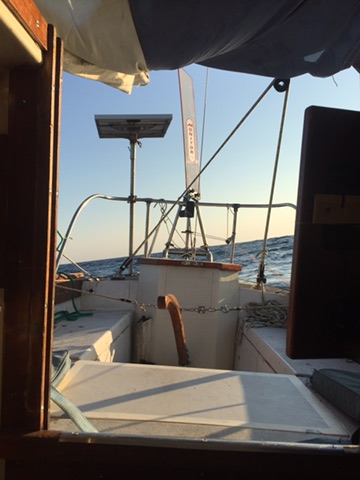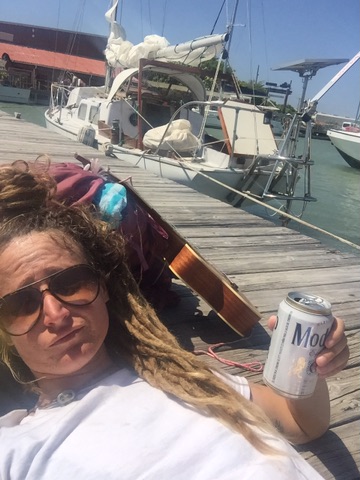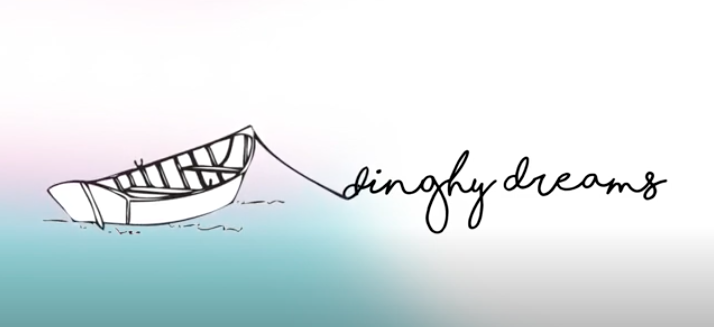
As we motored up the Rio Dulce and into the most majestic, lush, tranquil canyon that ever did exist the captain was stressed. We had to check out of the country and he didn’t know how much it would cost. He still hadn’t set up the foot pump for the water tank, and the gimbaled stove had also not been connected to the propane and tested yet. They both got done while I steered us out of the bay, but man were we cutting things close. While rowing back from customs we nearly got run over by a “launcha,” locally built wooden boats up to 25 feet long powered by sometimes massive outboard motors. This was a particularly large and fast launcha. I was watching it the entire time, but didn’t say anything to the Captain, waiting for him to look around at all but he was clearly in his own head.
“BOAT,” I yelled, right before it was almost too late. I stood up in the tippy rowboat ready to abandon it. The driver of the launcha saw my bright green shirt and my arms waving and veered off at the last minute from our bow. Within inches it seemed. It felt like a bad omen.
We motored out into the Gulf of Honduras and eventually met a brisk wind on the nose. According to the captain winds were predicted light and variable until a steady Southeast flow would ensue the next day. But even with steady trade winds the land has a funny effect on the winds outside of the Rio Dulce and it’s known to be a slog to get out of. That’s why the world cruising route favors the natural channel between the Guatemalan/Belizean coasts and the barrier reef. But we were not favoring the proven world cruising route, so we continued to claw our way offshore.
During our first night at sea in the Gulf of Honduras I counted 20 ships during my two watches. As we were tacking in between Guatemala and Honduras, my mind began to wander. These were some pretty impoverished nations. Pirate territory, maybe. Is that why so many cruisers favor the reef? The wind was dying and the captain came on deck for his watch. I voiced my concerns about pirates.
“Don’t mention that,” he said. As if I had jinxed us.
My nervous laughter returned. “Oh okay. Ha. Ha. Well, just might be a good idea to be have a plan.”
I went down below and am awoken an hour later to him calling
my name.
“GET UP HERE,” he says.
I poke my head out the companionway and it’s dead calm. The self-steering wind vane can’t do its job. We are motoring. He is readying his spear gun.
“What’s up?” I ask calmly.
“There was a boat.”
“What do you mean a boat?”
“A launcha, right behind us. It crossed our stern. It didn’t have any lights on. I shined the spot light on its hull and outboard motor.”
“Do you want me to get the flare gun?”
I come on deck although that seemed counter intuitive. If there were pirates isn’t it better they not see me on deck? There are no more signs of the boat. We sit there in silence. After a few minutes he now wants to talk about the plan for pirates. Give them anything they want I tell him. Of course, he says, you hide in the V-berth. He talks about how he could shoot them with the flare gun but the barrel that holds the flare is broken and he doesn’t know if it actually works. I sigh and go back down below. We don’t even have a working flare gun.
My second shift of the evening I find myself hand steering.
“Can we engage the autopilot?” I ask.
“It’s not set up for this boat,” he says.
“What do you mean? I see it has its own switch on the breaker panel. It even has a name, PePe.”
“It’s not set up for this boat.”
“Man that’s really something we should have set up before leaving? Was it ever set up? Does it just not work?”
“I thought you were a hardcore sailor.”
By the next morning there is still no wind and the swell is building from the east. I’m too seasick to cook and there is nothing to eat that doesn’t require cooking besides fruit. By the third day we are still clawing our way out of the Gulf of Honduras. We are averaging between 2-3 knots. We have managed to come together enough to get some meals cooked and I’m trying to convince the captain we can’t make it all the way to Key West with the food situation as such. We have to stop in Mexico. We haven’t even reached the Gulf Stream or gotten parallel with Belize City yet, which was only 120 miles north of where we left. I don’t know exactly how many miles we have traveled because he’s not keeping track on the paper chart. It’s not my style of navigating, but I don’t fight him because I’m exhausted and hungry and plotting the coordinates seems difficult. We have the GPS and Navionics going. It’s his boat, I tell myself.

The wind and seas are building and are right on the beam. We are still moving along slowly. By evening the captain is also fed up with seasickness and not having the right food to eat and he agrees to plot the course for Cozumel, Mexico. This feels like a win. Soon there will be food! I start thinking about my friends in the keys that I’ll get to see when we make land fall. I think about my friends that I had made in Rio Dulce. But I can’t escape a sinking scared feeling that something bad has happened back home. That someone is in trouble and I write in my log that day that I just want to make it back home.
Moving along still at only 2-3 knots we are getting punished by the wind and waves. By midnight it is 35 knots, gusting 40. Any semblance of a structured watch schedule that I tried to create went out the window after the first night. Now, in what very much feels like a gale, we are only getting one to one and a half hours of sleep each. I start thinking about what I’ll do when I get back to shore to boost morale. We are pointed into the wind with a triple reef in the main sail with tiller lashed to leeward. The boat can’t get enough momentum to tack and falls off. We are shittily hove to until conditions worsen and we are getting rocket launched off of waves. I’m pretty scared of a knock down at this point and start reading the storm tactics book in my bunk while intermittently poking my head outside and regularly watching the AIS. For some reason I’m not seasick anymore, but it is too rough to cook. On my next off watch I wake up to the loud crash of a wave beam-on and the captain scrambling up from his bunk to look at the AIS. He begins to franticly call a ship. He was asleep on his watch.
“Norwegian Cruise Lines, Norwegian Cruise lines this is the small sailboat off your port bow I cannot adjust course do you see me, over.”
“This is Norwegian cruise ship,” the ship captain replies calmly. “I don’t see you on radar or AIS. Over.”
The captain flashes the spotlight out into the night.
“Oh my god,” the ship’s captain comes back, his voice no longer calm. “I see you. I am changing course.”
I look outside and see the cruise ship cross our bow eerily close moments later. If it was daytime, and there were people on deck, I could surely have seen them. There’s my nervous laughter again. Another waves crashes into our beam and sends us flying. The captain is thrown into the stove and knocks it off its gimble. There is potato soup everywhere. I can hear panic in his voice. I try to clean up the soup and remain calm. The ships captain comes back on the radio. The gusts are getting stronger. You can hear and feel it.

“How long have you been out here,” the ships captain asks. “It’s fifty knots right now. It’s kind of crazy that you guys are out here. Really kind of crazy.”
We ask him for a weather report and he only has one for the next six hours, which doesn’t show the wind letting up. We tell him that we will likely run down wind to Belize City, which is about fifty miles west to get inside the protection of the reef and then 25 more miles south to the channel into the city. He tells us he thinks this is a good idea. I give him our position and ask him to notify the Coast Guard of it once he is in radio communication, so that they know where we are just in case. He tries calling the coast guard but is out of range. He wishes us good luck.
We both look at each other and don’t know what to do. We discuss options. I suggest heaving to with the storm jib back winded as well as the triple reefed main. He says he’s tried it before and he can’t get the boat to heave to like this. So I suggest we add the sea anchor to that mix but he doesn’t want to hoist the storm jib. He begins to ready the sea anchor but doesn’t want to use it in conjunction with any sails. Running down wind under bare poles to Belize City is an option, but neither of us know how the boat will handle that. How much is too much wind or how big are too big seas to run down wind. We don’t know what kind of control we will have with the boat like that and worry we might end up on the reef. He drops the main and we deploy the sea anchor. It doesn’t work. We are still just drifting along with the wind and seas on our beam. We go on like this for an hour, maybe more. He is apologizing to me. He is praying. He is saying, “I don’t know what to do. I don’t know what to do.”
It’s going to be okay, I remember saying. But maybe it wasn’t out loud.
He decides to haul in the failing sea anchor (which only works when hove-to properly with your sails from what I understand). He’s not sure if he will be able to get it in or if he will have to cut it. He is wearing my foul weather gear and tells me I have to go up on the bow to help him.
“No,” I say calmly.
The deck has been a mess since we left. There are halyards, reefing lines, lines used for sheeting angles, all over the deck. Nothing has been coiled. The oars are placed hazardously. I have no foul weather gear to wear because he is using mine, and there is no reason to risk my life going up on the bow for something that doesn’t require two people. It was not my boat, and I hadn’t had an equal part sailing the boat, and I didn’t feel comfortable going forward in these conditions because of that.
He begins to scream at me.
“WHAT?! You’re not going to help me?”
“I’m going to help you,” I say. “I’m just not going up on the bow.”
The sea anchor is hauled in from the cockpit, around the winch. The captain is very tired from all the maneuvering in this sea state and I’m sympathetic to that, but need him to see us through. Because neither of us are familiar with the bare poles storm tactic, we don’t know if the weather is going to get worse, and there is a reef pass we are going to have to navigate we decide it’s best to press the emergency alert button on the SPOT tracker so the folks at home can notify the Coast Guard of our position, just in case.
“What’s the worst case scenario you think?” I ask him.
“I don’t know,” he says. “We lose the boat and have to get plucked off the reef.”
I press the emergency alert button.
Early on in his hand steering us down wind, bare poles, fifty knots, 10-15 foot waves he says, “Emily I’m getting sleepy.”
I pop my head out of the companionway and yell at him.
“No,” I yell over the wind, behind us now. “That isn’t an option. See us through. Do this for your kids. Pretend your kids are onboard.”
Every time a wave crashes into the boat I yell out to make sure he hasn’t been thrown overboard and is still awake. I don’t sleep down below. I am finally familiarizing myself with the chart, which has now gotten wet and is torn into pieces. I’m taping it back together and reading about navigating the channel that I hope we will pass through safely. I don’t sleep. At one point I hallucinate that the captain is one of my ex boyfriends and I feel safer for a moment. I only break down once when I spill powdered milk all over and I start to think about my parents and how worried they must be and I just want to get back to shore so I can tell them I’m okay. We are making insanely good time down wind. The seas and wind don’t seem to be increasing. Eventually I come outside and hold the tiller while he hoists the storm jib. The wind vane can be engaged again. It’s midday now and it’s been the night and morning from hell. We come into radio range and I hear ships talking about a sailboat in distress. They are talking about us. I get on the radio and tell them that we are okay. I talk to a few ships, then finally the coast guard. They have to send a plane to confirm our coordinates before they can officially call off the alert that was put out for our boat. The plane passes overhead of what I can only imagine was quite a sight.
I thank the Coast Guard profusely and immediately feel ashamed and embarrassed. Wondering if I made the right call to push the button. I cry alone inside the cabin feeling like a terrible sailor.
Coming into the channel the night of our fourth day underway things are mildly euphoric. We are drinking a beer, we’ve eaten a meal, the seas are flat even though the wind is still howling. We drop anchor off of a Belizean mangrove. We are still ten miles from Belize City where I get off the boat.
The day I leave the Captain is beside himself that he has to pay to check in so I can leave, sighting that I should be responsible for the fees because this was a mutiny. Meanwhile it costs me way more money for a hotel that evening, and a flight home the next day. A total of $600 I had to borrow from my dad, plus the time and money lost for being away from my boat. The captain contributes nothing to my expenses. The captain insists on keeping my SPOT tracker.
“I might need it,” I say. “I might have another delivery when I get back. Whose to say you will even give it back to me? You haven’t made good on any of your promises and you are under so much self imposed stress you can’t think of anyone outside of yourself.”
He then tells me to call his partner and kids and tell them I wouldn’t lend it to him. He tells me I’m heartless. An argument ensues. He yells at me for not doing the dishes. Says I’ve been a useless crew. We almost crash into the rocks. He says he will give me money for the month of the SPOT tracker I already paid for but he doesn’t. I help him tie up. I leave him the tracker. The immigration officer stamps my passport.
I leave him in his boat, tied to the dock in Belize City at a marina he couldn’t afford, crying over the fees he just had to pay to customs and the weather report he’d just gotten that predicted winds too strong to sail in for the next three days.
“Keep it together out there man,” I say and walk away.

I spent that evening in a hotel room crying at random intervals. I call his partner and tell her I left. I tell her I’m sorry. I recount the tale to my friends and parents. Wondering what I could have done differently. Wondering what I could have done better. Wondering if I’d made the right call pressing the emergency button. My captain friends try and offer kind words.
“Staying would not have been ‘doing better’.”
“You send the alert early, because later might be too late.”
“You did what you had to do. You didn’t know how it would end.”
One person asked me what I had learned, specifically what I had learned about the conditions in regard to my boat.
“Could your boat have handled that?” they asked.
It was hard to put into words how much I had taken from this situation. I learned to trust my gut. To leave when the captain first exhibits warning signs of being unfit for sea, to know proper storm tactics, to never ever leave the dock without knowing the boat and its systems stem to stern, to heed the advice of local sailors and to respect world cruising routes. To not take a passive role when it comes to weather routing and navigating, especially if you are having doubts about the captain. I also learned what an amazing land support team I have, that the Coast Guard is going to do absolutely everything they can to get you home safely, and to always have float and emergency contingency plans in place.
There are still questions left unanswered.
What if conditions had gotten worse?
What caused the forecast to go from 35 to 50 knots?
What should I have done differently?
As far as my boat and how it would have handled those conditions? I would have never gotten into that position. Distress or disasters at sea happen because of a series of events… or choices.

